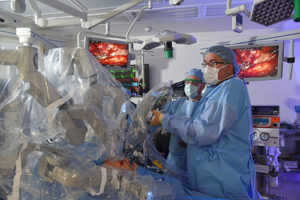UT SOUTHWESTERN’S CANCER CENTER OFFERS CALCULABLE HOPE
For an institution to receive a Lead Academic Participating Site grant for cancer research, it has to demonstrate its ability to enroll high numbers of patients into National Clinical Trials Network trials and scientific leadership in the design and conduction of clinical trials.
Only 32 have done so in the U.S. Among those is the UT Southwestern Harold C. Simmons Comprehensive Cancer Center in Dallas.

North Texas cancer patients are benefiting as a result, based on a Dartmouth study. That study showed a 25% decrease in one-year mortality rates for patients diagnosed with lung, breast, colorectal and prostate cancer and treated at National Cancer Institute (NCI) care centers. Recipients of the NCI grants effectively become a part of the National Clinical Trials Network.
“Patients increasingly seek performance ratings to guide their decisions in health care,” wrote Dartmouth researchers, in their paper, which was published in 2013. “NCI centers appear to be benchmarks of cancer care for survival. Further investigations of the aspects of care at cancer centers that afford this benefit would assist other institutions in improving their care.”
The Harold C. Simmons Comprehensive Cancer Center at UT Southwestern Medical Center has 257 cancer clinical trials in 25 disease categories, according to its director, Dr. Carlos L. Arteaga. The Simmons Cancer Center involves two Specialized Program of Research Excellence Awards: one in lung cancer — one of the largest thoracic oncology efforts in the U.S. — and the other in kidney cancer, one of just two in the nation in that field.
The center receives nearly $460 million in funds from the Cancer Prevention and Research Institute of Texas, as well as funding from the National Institutes of Health and philanthropic funds.
This article is part of the 2020 Higher Education Review Magazine.